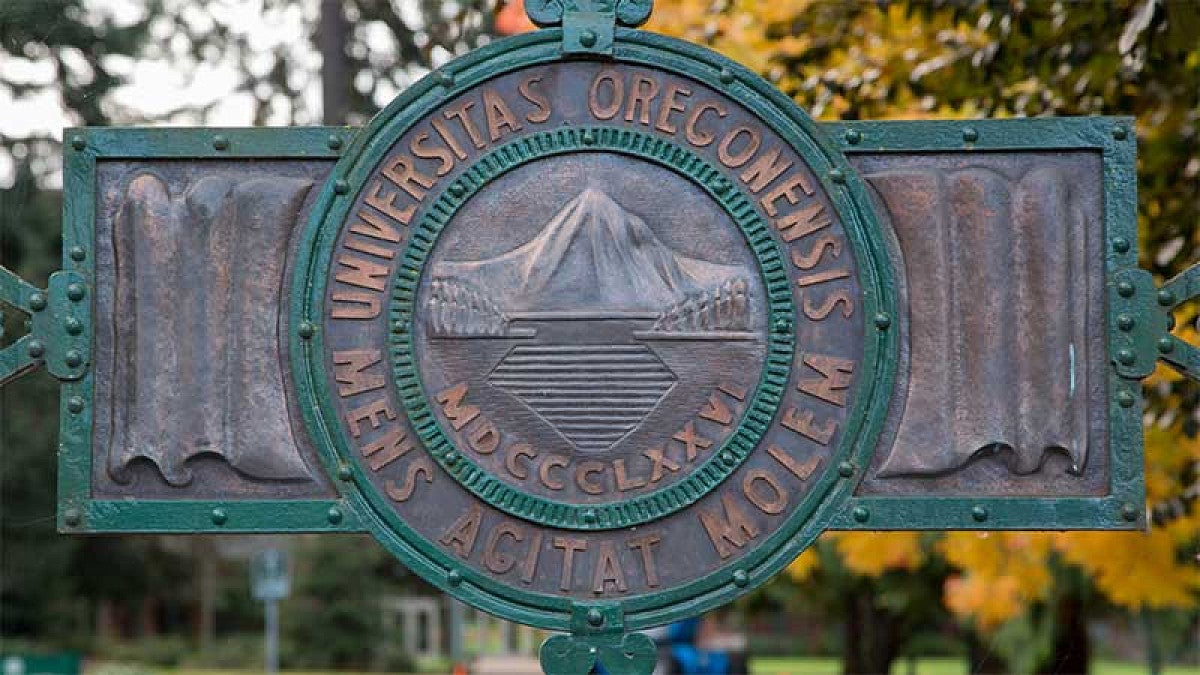Some students and staff returned to campus this term to find disturbing graffiti chalked in prominent locations, prompting a reminder on how the university responds to issues of bias and threats.
Among the slogans found on campus sidewalks were “Deport them all” and “End white guilt.” The graffiti is a reminder of the recent increase in bias incidents nationally as well as in Oregon and Eugene.
A recent article from The Oregonian highlighted the activities of local white nationalists and the efforts by antifascist groups to expose them.
RELATED INFO
The University of Oregon has standard, content-neutral practices for determining whether messaging is removed. Most building walls and campus fixtures, as well as most bulletin boards, are regulated.
Building or department operators may determine what content may be approved — for example, requiring that content is related to a particular program or published by university groups for a university audience. Unapproved or unrelated material may be removed. Material may not contain “true threats” of violence.
No markings, including chalking, may be left on campus buildings or other structures or surfaces. Chalking may be allowed on certain sidewalks and streets, but is subject to removal, consistent with campus maintenance standards and practices.
Any graffiti on campus should be reported as soon as possible to Campus Planning and Facilities Management’s customer service line, 541-346-2319, for cleanup.
Although the graffiti is surprising to some, it’s no shock to many of the groups targeted with hostile posters or crudely spray-painted epithets. According to Marcus Langford, University of Oregon assistant dean of students, the acts have left many students and employees anxious about their community.
"The nature of community is one where people feel accepted for who they are," Langford said. "Existing in a place where that is constantly being challenged and called into question can be mentally and emotionally taxing. It’s important that all members of our community see these actions as problematic and work to ensure that they are addressed."
University police and campus leaders — from the Office of the President to the Division of Student Life, Division of Equity and Inclusion, Office of the General Counsel and Campus Planning and Facilities Management — have worked to support vulnerable groups and maintain a safe, inclusive climate, while not trampling constitutionally protected, but sometimes vile, speech.
“I strongly condemn all forms of hate speech and racism,” said Michael H. Schill, UO president and professor of law. “I am troubled by the recent reports of an uptick in both subtle and overt acts of racism on campus and in the surrounding community. I have asked our law enforcement team to work with partners both here on campus and throughout Eugene to do everything they can within the law to provide a safe learning environment for our students that is free from threats and intimidation. The language of white supremacy has no place in our community.”
UOPD Chief Matt Carmichael said his team is committed to campus safety, which requires law enforcement to consider how to also protect principles of free expression that are protected by UO policy as well as the Oregon and United States constitutions.
"We know if speech like this goes unchallenged it can lead to worse and sometimes violent intimidation or harassment," Carmichael said. "We have to work with what's in the law, though, and not guess as to what might be the eventual outcome of obnoxious-but-legal speech. We want to apply our police authority appropriately, investigating incidents and creating a climate that deters or arrests criminal conduct."
UOPD will investigate reports of threats and crimes, monitor and patrol campus 24 hours each day and communicate with regional law enforcement partners about trends and incidents related to hate crimes or white supremacist activities. The department has access to more than 850 cameras on campus and police personnel can review security footage after an incident to try to determine what happened and identify the people involved, whether the issue is bike theft, vandalism or harassment.
"Even if something may not technically be criminal, it may violate UO or city of Eugene policies and should be addressed regardless of viewpoint," Carmichael said. "And we want to know and share with our partners what these groups are doing, since it certainly affects our climate and might be a sign of serious trends."
Carmichael encourages members of the community to document and quickly report incidents of bias, including white supremacist fliers or graffiti, by calling 541-346-2919 in nonemergencies or 911 in an emergency.
Later in January, UOPD and the local FBI office will host a meeting at the UO with campus groups and community leaders affected by rising bias issues. The FBI supervisory senior resident agent will share resources for hate crime prevention and response.
Schill has said repeatedly that when speech is against the values of the university and serves to further marginalize members of the campus, it deserves condemnation.
"What we want everyone in our campus community to know is that regardless of these shameful instances, the UO welcomes and values all its members, and that Ducks will take care of one another."
The UO community has additional resources beyond UOPD. The Respect website, respect.uoregon.edu, and phone line are available to report hate crimes, bias, discrimination or discriminatory harassment. The site has resources for students and employees, and reports made to the phone line at 541-346-3216 can be made anonymously.
When reports include information about campus incidents that involve student or employee perpetrators, the UO can investigate and take action. Even with unidentified perpetrators, the information can be shared with police or local support groups to help drive prevention and healing efforts.
Additionally, the Office of the Provost and Academic Affairs and the Division of Equity and Inclusion also have shared information and resources with instructors about addressing conflicts or bias speech in the classroom.


